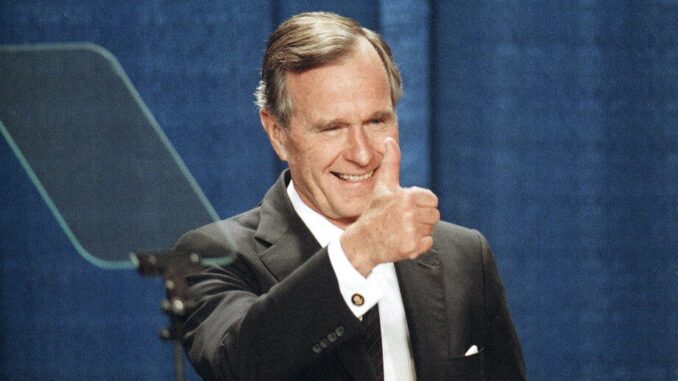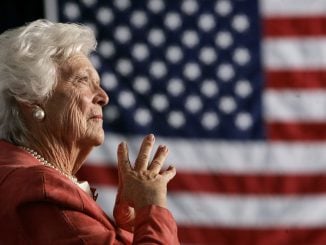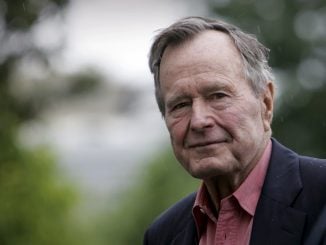
Scholars have debated for centuries whether history is predetermined — shaped by various forces — or if history is made by daring leaders in decisive moments, changing the course of events and lives. A hundred years ago, a great man came into the world, a man who changed people’s lives, whether he was sitting in the Oval Office or at his neighbor’s dinner table ― George Herbert Walker Bush.
Our world needs leaders like George H.W. Bush. Most people know the facts about Bush’s political accomplishments: he oversaw the peaceful end of the Cold War, expelled Saddam Hussein from Kuwait, and passed the Americans with Disabilities Act, to name a few. In honor of his 100th birthday, let’s celebrate this true man of history by drawing on lessons from his life and applying them to our lives.
Duty. On Sept. 2, 1944, Lt. George Bush had a mission. He was a naval aviator. Bush boarded his Avenger fighter plane and took off to bomb the heavily guarded Japanese base on the island of Chichi-jima. Before he could reach his target, his plane was hit by enemy fire. Despite smoke and fire engulfing his plane, Bush had a mission to complete.
He continued on, dropped his bombs and destroyed his target. His plane was still on fire, so he bailed out and parachuted into the sea. After landing in the water several miles off the island, paddling on a raft and praying for three hours, Bush saw a black spot emerging from the water. It was a U.S. submarine, the USS Finback.
Bush climbed aboard and escaped from danger. He was given the option to go home but instead rejoined his fellow naval aviators and continued to fly combat missions through the war. While everyone’s life circumstances are different, we can all embody the same spirit of duty that Bush exemplified. Whether in the halls of Congress, the boardrooms of local companies or the kitchen tables in our neighborhoods, we all have the ability to serve others and sacrifice our own gain for the benefit of others. We just have to choose to do so.
Adventure. The dusty oil fields of West Texas have little in common with the plush offices of Wall Street. Bush had choices to make when he graduated from college. The kid from Greenwich, Connecticut, had offers to work in investment banking. He could have taken the easy route; working for his uncle on Wall Street, making lots of money and having the comforts of being close to family.
Bush wanted to blaze his own path. The oil business at the time was booming but full of risk. You could make it big, or you could go broke. He decided on taking his chances in the oil industry and moved his family to Odessa, Texas, where he got a job as an equipment clerk. His salary was $375 a month.
After several years learning the oil industry in different jobs, moving constantly, he went out on his own. As an entrepreneur, Bush took bold risks. He launched several companies and was a pioneer in the offshore drilling industry. This spirit of adventure lasted his entire life.
After his time in the White House, President Bush famously celebrated every fifth birthday by skydiving. Even on his 90th birthday, despite being confined to a wheelchair, Bush strapped on his parachute for a skydive.
Leadership. President Bush was known for his personal diplomacy. It’s a relational brand of leadership: leading by persuasion, developing trusted relationships (with the world’s most powerful leaders or with neighbors) and harnessing them to achieve a common goal. Whether convincing Mikhail Gorbachev to allow for the peaceful collapse of the USSR, or penning a thank-you note to a new acquaintance, Bush’s leadership style was one based on trust, respect and convincing others to take the right course.
Don’t confuse this kindness for weakness. Bush’s leadership style was both optimistic and effective. It was collaborative but tough. This is in stark contrast with many of today’s leaders, who are known more for their narcissism and “you’re either with me or against me” attitude. As a result, self-interest is regularly elevated above the public good. Our leaders would do well to learn from George H.W. Bush and adopt his relational style of leadership.
On what would have been his 100th birthday, let’s celebrate duty. Let’s not be afraid of adventure. Let’s lead by putting others first. And let’s be as confident as ever in the goodness and opportunity of America.
Karl Beckstein lives in Raleigh.



